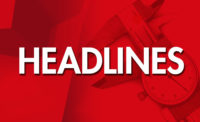SAN JOSE, CA-Customers who purchase test and measurement equipments, also require calibration services thus making calibration a core part of total quality management (TQM). Calibration services verify the accuracy and precision of test equipment in providing measurement readings at various points, and provide associated documentation. Calibration endows customers with the confidence that their product testing is credible and their measurements accurate. At the same time, a horde of international legal rulings, standards, and guidelines such as GMP, FDA, DIN EN ISO 9000ff, TS ISO 16949, and VDA 6.4, compel manufacturers to validate that the calibration of test & measurement equipment is up-to-date and comprehensive. This implies test & measurement equipment used to measure process and product quality must be acknowledged and calibrated at periodic intervals, and documented. Growth in the calibration services market is influenced by number of internal factors such as lab accreditation, service quality, personnel expertise, and external factors such as general economic conditions and installed base of process instruments.
While few end-users in the manufacturing industry, as part of their aggressive cost control measures, postpone periodic/regular calibration in attempts to reduce downtime and operational overheads, the industry is largely shielded from the recession as instrument/equipment calibration cannot be postponed for long. On the contrary, calibration may actually benefit from a recession because of its ability to improve profitability and productivity through less machine downtime, an added impetus for adoption especially during tough economic and financial climate. Also, manufacturers across various end-use sectors, in a bid to become lean, mean and efficient, are focusing on core competencies, and downsizing their workforce. They have also shown willingness to outsource non-core activities such as calibration to third-party service providers, thus providing growth opportunities for participants.
As stated by the new market research report on Calibration Services, North America, and Europe together dominate the global Calibration Services market. Fuelled by a large installed base of electronic and electrical equipment and growth in communication sector, calibration of electrical and communication equipment is expected to occupy a major share of the global calibration services market.
Key players in this marketplace include Agilent Technologies Inc, Dowding & Mills Plc, Fluke Corporation, GE Kaye Europe, Optical Test and Calibration Limited, Rohde & Schwarz GmbH & Co. KG, Siemens AG, SIMCO Electronics, Stork INTERMES NV, Sypris Test & Measurement Inc, Tektronix Inc, Tradinco Instruments B.V., Transcat Inc, Trescal Limited, among others.
The report titled “Calibration Services: A Global Strategic Business Report” announced by Global Industry Analysts, Inc., provides a review of noteworthy market trends, growth drivers and challenges. The report in addition also enumerates recent acquisitions, and other strategic industry activities. The report offers market estimates and projections for World Calibration Services market in dollar revenues for the following regions: North America, Europe, Asia-Pacific and Rest of World. The report also offers market estimates and projections for calibration services by type -Mechanical Calibration Services, Electrical Calibration Services, Physical/Dimensional Calibration Services, and Thermodynamic Calibration Services, across end-use segments, such as, Electronic Manufacturing, Communication, Aerospace & Defence, Industrial & Automotive and Others.
Global Calibration Services Market to Reach U.S. $4.1 Billion by 2015
Looking for a reprint of this article?
From high-res PDFs to custom plaques, order your copy today!




